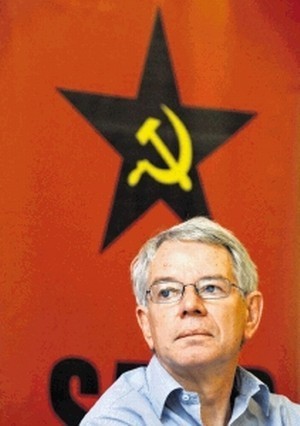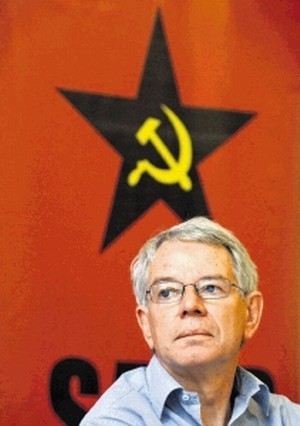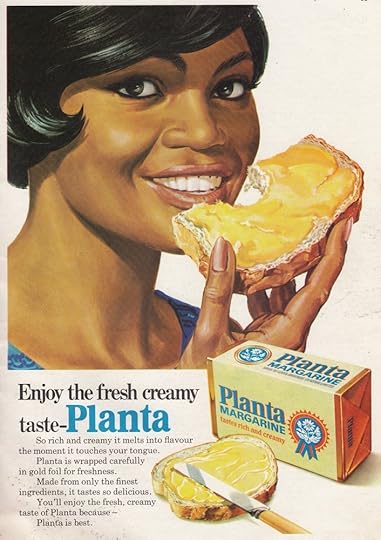Sean Jacobs's Blog, page 634
June 22, 2011
The Party is not The Nation
From that same interview that I have been so liberally cutting and pasting from this week—in Comparative Literature–the Communist poet and intellectual, Jeremy Cronin, talks about the conundrum for black intellectuals after the end of Apartheid:
… For obvious reasons that I've already alluded to, a great premium is placed on unity and loyalty within the culture of the ANC-led liberation movement. In the days of illegality and repression, carefree individualism could be a deadly indulgence. Unity and loyalty are still important. But national liberation movements, pre- and postindependence, also have a problematic habit of identifying themselves as "the nation." There are numerous examples crystallized in once-popular slogans: "CPP is Ghana, Ghana is CPP"; "SWAPO is the Nation, the Nation is SWAPO"; "the Kenyan African National Union is the Mother and Father of the Nation."
I have never heard anyone quite say these things of the ANC, but there are strong inclinations in this direction. To be politically outside of the ANC is still often characterized as being part of the "enemy" forces. To differ with the majority line within the ANC is sometimes to risk being accused of "siding" with the "enemy." Lenin was fond of quoting [Carl von] Clausewitz's maxim, "War is politics by other means." But Lenin (even Lenin) never claimed that politics is war by other means. He quite correctly insisted on the primacy of a political understanding of war. Politicizing the military is one thing; the converse is quite another. Unfortunately, militarizing politics (at least discursively, by regarding all opposition as the enemy) is a natural but ruinous habit in political formations, particularly those that have waged armed struggles.
…I know that in South Africa, many black intellectuals, in particular, have recently battled with the inner dilemma of disagreeing with the ANC government. There is a sense of betraying their own, of feeding the racial stereotype that black majority governments "are bound to fail." The [former] vice chancellor of the University of Cape Town, a fine novelist and essayist, Njabulo Ndebele, wrote in 2003, "I increasingly experience the need to transgress but feel anguished by the thought that my transgressions, committed in the belief that they represent a process of democratic self-actualization, could be mistaken for the outmoded oppositions of old." I would venture to say that increasingly among a wide range of black intellectuals and others, this sense of anguish is no longer so strong. Both from within the ANC-led movement and in other quarters, not least among a feisty new generation of black journalists and columnists, there are robust critical voices that are prepared to oppose government on many issues without being oppositionist for its own sake.
I have never quite shared Ndebele's sense of anguish. Being simultaneously a member of both the ANC and its allied SACP (we are an interesting and, internationally, probably unique political alliance with overlapping memberships) has provided me with organizational spaces that are neither oppositionist nor monolithically univocal. Nelson Mandela, after I had unintentionally and unknowingly irritated him, and not for the first time, once told a comrade that he was convinced I had a "split personality"—good on some days, not good at all on others. In mitigation, I would argue that a bipolar disorder is a necessary attribute in our post- (or is it neo-?) colonial reality in which, to paraphrase Gramsci, we are living in a time when the old is dying and the new is still struggling to be born.
Source: Comparative Literature (You need a subscription and a password to read the full interview.)








This Generation of African Women Leaders
Dan Moshenberg has written guest posts for AIAC before and we've HT'd him a few times. But this posts marks the first of his weekly posts here on gender politics. He'll keep the focus on Africa. Like today when he discusses Michelle Obama's South Africa trip. Dan, who has lived in South Africa (I've known him for about 16 years), blogs at Women In and Beyond the Global (go check it out);and is director of Women's Studies at George Washington University in Washington D.C.So watch out for it on Wednesdays–Sean Jacobs
Dan Moshenberg
What's a young African woman leader, today, and who decides? Michelle Obama travelled to South Africa to talk to the Young African Women Leaders Forum, a forum organized and funded by "the U.S. Department of State, the U.S. Embassy in South Africa, the U.S. Agency for International Development, and the White House." The Forum has three objectives: expression of "aspirations and values"; becoming "better partners in building a more just, democratic and prosperous future"; and, my favorite, "to help empower young African women".
Because, as we know, the empowerment and emancipation of young African women begins at the intersection of the U.S. Department of State, USAID, and the White House, where African women learn to express themselves and become better partners. Amandla! Awethu?
Irrespective, or not, of the funding circumstances, and setting aside the whole photo-op politics of the event, Michelle Obama gave a decent talk. Rousing, informative, engaging, and politically sharp. The United States First Lady mentioned a number of women, including Graca Machel, Baleika Mbete, Robyn Kriel, Grace Nanyonga, Gqibelo Dandala. She lingered over the memory and significance of Albertina Ma Sisulu's life and lifework. In short, it was a talk directed at women, at young African women.
However, if you were to read the reports of Ms. Obama's speech, and of the Young African Women Leaders Forum, in the New York Times, you'd find … nothing. Pretty much the same for the Washington Post.
ABC News covered the event, sort of. They did mention Gqibelo Dandala … as a prop:
She pronounced all of their names with perfect local diction. The audience laughed and clapped when Mrs. Obama mentioned a woman named Gqibelo Dandala and used the click sound in the Xhosa language from which the name derived.
Is that all Gqibelo Dandala is? A prop? What did she actually do to be invited to the Forum? In 2007. Gqibelo Dandala founded the Future of the African Daughter project, FOTAD, which works with girls, 12 – 19, from rural areas and townships. Ms. Obama talks about Dandala's work, but all that's reported is that that African woman sure has a funny name, and that `articulate' African American woman did a helluva job pronouncing it. And the crowd went wild.
The videos are no better. For example, Britain's Channel 4 News chose a two-minute part of the speech that focused largely on HIV-AIDS, and then ended with, "You can be the generation to ensure that women are no longer second-class citizens, that girls take their rightful places in our schools. You can be the generation that stands up and says that violence against women in any form, in any place including the home –- especially the home –- that isn't just a women's rights violation. It's a human rights violation. And it has no place in any society. You see, that is the history that your generation can make".
But how can this generation of young African women be that generation? In Michelle Obama's speech, the charge somewhat makes sense. It has a context and a history. In the constructions of the US-based media, there's no context, there's no historical justification. There's only good will and good intention.
The Forum has brought together 76 young women from across the African continent. Every one of them has a name. So do their mothers, sisters, aunts, daughters. Every one of them has done something. But don't bother to look for their names in The New York Times or The Washington Post. They're not there.








Tartan Army
Kathleen Madden, in Artforum, on Zwelethu Mthethwa's 2010 series "The Braves Ones," showing through July 17th at the Victoria and Albert Museum in London:
["The Brave Ones"] documents Zulu boys from the Shembe church wearing pink gingham or rich red tartan kilts with tribal hats, a mixed visual code that evokes the Scottish Highlanders who were deployed to the region in the late nineteenth century. The boys pose before the lush backdrop of the KwaZulu Natal, aka the "garden province," making them appear timeless in an Arcadian landscape.








Dakar Hustle
Video for spoken word from Senegalese rapper Keyti–remember him? Keyti was one of the stars of Ben Herson's 2009 documentary film about hip hop and politics in the Senegalese capital, "Democracy in Dakar." The video is directed by Magee McIlvaine.
Via Nomadic Wax.








June 21, 2011
Pseudo-cosmopolitanism
More from that 2008 Comparative Literature interview with my favorite Communist poet, Jeremy Cronin. Bua Komanisi:
… A sense of audience has always been important for me. When I write a poem, or when I go back to an old poem, I try to listen to it with the ear of someone else, perhaps an audience, real or imagined. One audience whose feedback and engagement I have always appreciated is the relatively small circle of fellow South African poets, critics, and academics teaching poetry. But I have also always wanted to write a poetry that is generally accessible to a wider audience.
In this I have not always succeeded, of course. The failing is not just personal; there are many objective challenges. There are, for instance, eleven official languages in South Africa, and while English is the major lingua franca, writing poetry in English is not necessarily an advantage. Afrikaner nationalism, with all of its reactionary tendencies and faults, was centrally a cultural and language-based movement, and poetry was (and still is) cherished amongst a broader Afrikaans-language public. This has never been the case with the often pseudo-cosmopolitan, white, English-speaking community into which I was born. Major English-language South African writers—like the two Nobel laureates, Nadine Gordimer and John Coetzee—tend to be much better known outside of South Africa and tend to write, one suspects, with a European or North American audience in mind. For me, oral performances, particularly in contexts which are not narrowly poetical (a trade union meeting, or a political conference, for instance), have been a very important means for reaching a wider, more diverse audience.
Source: Comparative Literature.








Music Break
Rapper Stalley, late last year, channels Muhammed Ali. He could have done without the racial epithet.








An African in the Arctic
Elliot Ross, Guest Blogger
The former antiapartheid activist who now heads Greenpeace, Kumi Naidoo, spent his weekend in a Greenland jail after a headline-grabbing dash onto an Arctic sea oil rig. Naidoo, who is from Chatsworth in Durban, dodged a Danish war-ship and hauled himself up an 80 ft ladder attached to one of the rig's legs while being pummeled by freezing water cannons fired from above.
"People may wonder why I, as an African, care about what is happening in the Arctic," said Naidoo, before hopping into his speedboat, "but scientists say the unprecedented warming up here could have grave knock-on consequences for vulnerable people across the world."
Once on board the rig, Naidoo attempted to hand over a 50,000 name-long petition calling for the Scottish firm Cairn – which operates the Leiv Eiriksson rig – to stop drilling in the Arctic, and requested a copy of their oil-spill response plan. (He believes they don't have one, because it wouldn't be possible to contain such a catastrophe if it happened in the Arctic).
The Greenland penitentiary system will be a new one for Naidoo, who was regularly arrested by South African police under apartheid. The former hunger-striker sounded upbeat about prison rations in a letter sent to friends and family at Durban University of Technology:
"Actually having three meals a day which with my schedule is normally rare as you know… and on regular times too. Just missing spicy food though," he wrote.
Naidoo was offered his job as Greenpeace's international executive director in 2009, while on the 19th day of a 21 day hunger strike protesting against Robert Mugabe's regime and the food crisis in Zimbabwe.
Previously, he had chaired the Global Call to Action against Poverty, a role in which he famously enraged Bob Geldof. Following the G8 meeting at Gleneagles in 2005, Naidoo refused to take part in any of the post-global-poverty-summit-backslapping for which Geldof has become known.
"The world has roared", Naidoo said, "but the G8 has responded with a whisper."
Sir Bob defended Tony Blair and other G8 leaders, called Naidoo's statement a "disgrace", and gave his own verdict on what had been achieved: "Ten out of ten", he said.
It will be very interesting to see what Naidoo has planned for the critical UN meeting on global climate change this November – the organizers have obliged him by choosing to hold it in Durban, Naidoo's hometown.
* Elliot Ross is a graduate student at Columbia University's Journalism School.








The Russian Connection
Russia may now be object of black people's nightmares. But a long time ago Africans looked to Russia, well the Soviet Union. Let's take cinema. "The father of African cinema" Ousmane Sembene went to study there. And Soviet cinema had a major impact on the narratives, styles and tone of a generation of African filmmakers afterwards. That connection was the subject of a public panel, "The Russian Connection," earlier this year at Gasworks Gallery in London. This is an edited video of that panel which I finally watched this weekend. (It's summer so I am catching up.) The panel consisted of film scholars Jeremy Hicks and Ros Gray as well as the artist and writer Kodwo Eshun.
* The event was to celebrate the work of Guadeloupean filmmaker Sarah Maldoror, the director of the 1973 film, "Guns for Banta," about the liberation war against Portuguese colonialism in Guinea-Bissau. Maldoror was a classmate of Sembene. The event was held at Gasworks Gallery in London in February 2011. It was curated by Basia Lewandowska Cummings. The panel was an extension of an exhibition, also at Gasworks Gallery, "Foreword to Guns For Banta," by artist Matthieu Kleyebe Abbonenc.








'The Nigerian Nostalgia Project'
This Facebook group page is worth visiting. The administrators collect photographs, including video and sound bytes, "… depicting scenes and people from Nigeria between 1960 and 1980."








'Imagine life without photos'
A worthwhile project by two Canadian brothers who grew up in 1970s Liberia–it still feels like 25% of the city are expats–to restore photo memory because so many people here don't know what Monrovia looked like before the war.








Sean Jacobs's Blog
- Sean Jacobs's profile
- 4 followers










